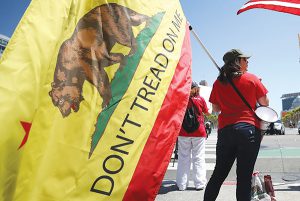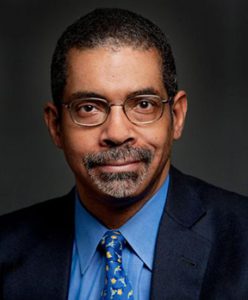Secession, of all things, is back in the news. Residents of San Bernardino County, the largest in California, are debating whether to try to break off and form a state of their own. And there’s more: Last month, a New Hampshire electoral commission refused to bar from the ballot legislators who want their state to leave the US entirely. A citizens’ group had charged the legislators, absurdly, with insurrection.
Secession movements are nothing new, and punishing their advocates is a dreadful idea. Their causes are complex and, almost always, point to problems that should be taken seriously.
Let’s start with those who want their states to leave the country. The last time that was seriously attempted, a divided nation fought a war that cost an astonishing 600,000 lives. President Abraham Lincoln’s 1861 proclamation calling forth the militia to suppress the insurrection is one of the great documents of political history. But it hardly follows that everyone who advocates carving out a new nation from pieces of the US is an insurrectionist.
Consider the issue of race. In 1917, inspired by the Irish rebellion, the crusading black journalist Cyril Briggs published an essay arguing that “reason and justice†demanded establishment of a new Black-run country within the borders of the US, in return for “many generations of unrequited toil and half a century of contribution, as free men, to American prosperity.†Eleven years later, the Communist International would cite Briggs’s article in adopting a resolution calling for Black self-determination in the US.
From the 1930s onward, any number of radicals would argue for creation of a separate Black entity. In the late 1960s, the Republic of New Afrika called for a new country to be established in what was known as the Black Belt. (This might have been part of the inspiration for Fletcher Knebel’s so-so 1969 novel “Trespass,†in which a group of Black militants takes prominent White people hostage and demands the immediate creation of a Southern homeland for the descendants of slaves.) In 1982, James Forman, head of the Student Nonviolent Coordinating Committee, published “Self-Determination and the African-American People,†in which he argued for the creation of a new country within the “historic homeland†of the Black Belt. He pointed out wryly that with 958,000 square miles to choose from, there was sure to be space.
As I’ve noted before in this space, up until Jan. 6, 2021, many a Black radical proudly wore the label of insurrectionist. Should they have been kept from running for office thereafter? Or should the nation have tried to gain a deeper sense of their grievances?
Examples also abound that have no connection with the nation’s history of racial oppression. I’m old enough to remember the Martha’s Vineyard secession movement of the late 1970s, which culminated in a 10-2 vote by the selectmen to leave Massachusetts and either establish a new state or join an existing one. Some residents went further, proposing independence from the US. You can still purchase the Seagull flag that some hoped would fly over the island. Insurrectionists all?
Bits and pieces of California have been arguing for secession from the US for years. Silicon Valley bigwigs, for example, have long talked of forming a new country, originally in search of a libertarian paradise, and then to protest the election of President Donald Trump. As a matter of fact, Trump’s 2016 victory led to cries across the deep-blue states that the time had come to set up shop on their own.
Obviously not. We shouldn’t punish secession talk. Kudos for New Hampshire for understanding this.
On the other hand, nobody’s trying to punish leaders of San Bernardino County’s effort to secede not from the US but from California. Maybe that’s because nobody thinks they have a chance of succeeding. Under the US Constitution, carving out a new state requires the consent of both the state losing territory and the US Congress. (For this reason, some scholars question whether West Virginia is actually a state. Seriously.)
It’s true that back in the 1960s, the California senate passed a bill that would have broken the state in two. But that was a transparent effort to gain more power in Washington by doubling the number of senators, and never got anywhere.
Still, size might matter. Advocates point out that San Bernardino County is larger than the combined land area of Connecticut, Delaware, New Jersey and Rhode Island. Their substantive argument, however, has nothing to do with size. They claim that the urbanites who hold power in Sacramento ignore the concerns of rural counties. (Long before the Civil War, an analogous claim was made by West Virginia statehood advocates, and the state’s first governor cited as the justification for leaving Virginia his region’s treatment “as a sort of outside appendage — a territory in a state of pupilage.â€)
As the legal scholar Glenn Harlan Reynolds (formerly my student) points out in his much-discussed 2019 essay on secession movements, the argument is common. Whether we’re speaking of eastern Oregonites or upstate New Yorkers who want new states, the central concern seems to be that people feel ignored. Reynolds argues that the states should either let their rural counties leave or take their concerns more seriously — in particular, that legislatures shouldn’t be so swift to assume that regulations appropriate to the city also make sense elsewhere.
Fair enough. But would regulatory reform be enough? A new paper argues, from a study of thousands of secession movements around the world, that a group’s sense of shared cultural identity is a more important predictor than economics. Philosophers have long debated whether the existence of a common identity built around culture creates a prima facie case for secession. Whatever the answer, the new research suggests that if we’re as hopelessly polarized as pundits seem to think, we’re in for a lot more secession talk in the years to come.
—Bloomberg
Stephen L. Carter is a Bloomberg Opinion columnist. He is a professor of law at Yale University and was a clerk to US Supreme Court Justice Thurgood Marshall
 The Gulf Time Newspaper One of the finest business newspapers in the UAE brought to you by our professional writers and editors.
The Gulf Time Newspaper One of the finest business newspapers in the UAE brought to you by our professional writers and editors.

